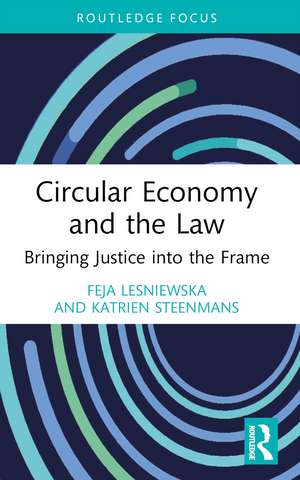Circular Economy and the Law: Bringing Justice into the Frame: Routledge Focus on Environment and Sustainability
Autor Feja Lesniewska, Katrien Steenmansen Limba Engleză Paperback – 26 aug 2024
Amid increasing demand for virgin raw materials, and unsustainable consumption and waste disposal that are driving the global ecological and climate crisis, there are growing calls to urgently transition to circular economies. Despite an increasing number of circular approaches being adopted, implemented, and integrated in national and local laws and policies, the number of commercially successful business stories remains isolated. Moreover, questions about whether circular economy laws and policies are delivering fair and just global outcomes need to be addressed. This book examines this significant knowledge gap to understand legal experiences, including justice and equity issues in the global context, so that these can inform wider design and implementation. The book begins by explaining the concept of a circular economy and its context within wider issues of sustainable development and justice. The first part of the book then examines the legal context of the circular economy by analysing legal forms in practice and those recommended in wider scholarship before considering how these could impact on existing inequity and injustices globally. The second part delivers an empirical understanding of the implications of the law on circular economy approaches and the global equity and justice dimensions through two case studies on solid waste management and forestry. The final part addresses legal opportunities and challenges for wider implementation of circular economy approaches that incorporate justice into its framing.
This book will be of great interest to students, scholars, and practitioners of environmental and natural resource law and policy, circular economy, industrial ecology, natural resource management, and sustainable development more broadly.
| Toate formatele și edițiile | Preț | Express |
|---|---|---|
| Paperback (1) | 154.07 lei 3-5 săpt. | +12.38 lei 6-12 zile |
| Taylor & Francis – 26 aug 2024 | 154.07 lei 3-5 săpt. | +12.38 lei 6-12 zile |
| Hardback (1) | 400.75 lei 3-5 săpt. | +18.67 lei 6-12 zile |
| Taylor & Francis – 2 feb 2023 | 400.75 lei 3-5 săpt. | +18.67 lei 6-12 zile |
Din seria Routledge Focus on Environment and Sustainability
- 8%
 Preț: 383.54 lei
Preț: 383.54 lei -
 Preț: 384.83 lei
Preț: 384.83 lei -
 Preț: 141.71 lei
Preț: 141.71 lei -
 Preț: 136.89 lei
Preț: 136.89 lei -
 Preț: 152.79 lei
Preț: 152.79 lei - 8%
 Preț: 381.13 lei
Preț: 381.13 lei - 5%
 Preț: 130.54 lei
Preț: 130.54 lei -
 Preț: 167.54 lei
Preț: 167.54 lei -
 Preț: 152.26 lei
Preț: 152.26 lei -
 Preț: 152.45 lei
Preț: 152.45 lei -
 Preț: 152.45 lei
Preț: 152.45 lei -
 Preț: 152.74 lei
Preț: 152.74 lei - 8%
 Preț: 382.90 lei
Preț: 382.90 lei -
 Preț: 155.44 lei
Preț: 155.44 lei - 8%
 Preț: 382.96 lei
Preț: 382.96 lei -
 Preț: 252.91 lei
Preț: 252.91 lei -
 Preț: 160.10 lei
Preț: 160.10 lei - 8%
 Preț: 388.88 lei
Preț: 388.88 lei -
 Preț: 386.78 lei
Preț: 386.78 lei - 8%
 Preț: 390.51 lei
Preț: 390.51 lei - 8%
 Preț: 388.44 lei
Preț: 388.44 lei -
 Preț: 385.36 lei
Preț: 385.36 lei -
 Preț: 384.34 lei
Preț: 384.34 lei -
 Preț: 394.38 lei
Preț: 394.38 lei - 15%
 Preț: 456.63 lei
Preț: 456.63 lei -
 Preț: 189.59 lei
Preț: 189.59 lei - 26%
 Preț: 761.76 lei
Preț: 761.76 lei -
 Preț: 463.77 lei
Preț: 463.77 lei -
 Preț: 479.94 lei
Preț: 479.94 lei -
 Preț: 200.19 lei
Preț: 200.19 lei - 13%
 Preț: 334.72 lei
Preț: 334.72 lei -
 Preț: 167.54 lei
Preț: 167.54 lei - 24%
 Preț: 326.95 lei
Preț: 326.95 lei - 5%
 Preț: 444.07 lei
Preț: 444.07 lei -
 Preț: 463.40 lei
Preț: 463.40 lei -
 Preț: 460.69 lei
Preț: 460.69 lei - 22%
 Preț: 125.78 lei
Preț: 125.78 lei -
 Preț: 461.15 lei
Preț: 461.15 lei -
 Preț: 186.91 lei
Preț: 186.91 lei -
 Preț: 425.37 lei
Preț: 425.37 lei
Preț: 154.07 lei
Nou
Puncte Express: 231
Preț estimativ în valută:
29.48€ • 31.53$ • 24.58£
29.48€ • 31.53$ • 24.58£
Carte disponibilă
Livrare economică 27 martie-10 aprilie
Livrare express 12-18 martie pentru 22.37 lei
Preluare comenzi: 021 569.72.76
Specificații
ISBN-13: 9781032436586
ISBN-10: 1032436581
Pagini: 174
Ilustrații: 2
Dimensiuni: 138 x 216 x 12 mm
Greutate: 0.32 kg
Ediția:1
Editura: Taylor & Francis
Colecția Routledge
Seria Routledge Focus on Environment and Sustainability
Locul publicării:Oxford, United Kingdom
ISBN-10: 1032436581
Pagini: 174
Ilustrații: 2
Dimensiuni: 138 x 216 x 12 mm
Greutate: 0.32 kg
Ediția:1
Editura: Taylor & Francis
Colecția Routledge
Seria Routledge Focus on Environment and Sustainability
Locul publicării:Oxford, United Kingdom
Public țintă
AcademicCuprins
1. Introduction 2. Locating circular economies within the law 3. Equity, justice, and law in circular economies 4. Circular plastics economy 5. Circular bioeconomy and forests 6. Case study analysis 7. Conclusions and future research landscape
Notă biografică
Feja Lesniewska is a Lecturer and Research Fellow in the Institute for Sustainable Resources and UCL Laws at University College London, UK. She holds a PhD in Sustainable Development and International Law from SOAS University of London, UK.
Katrien Steenmans is a Postdoctoral Researcher at the Centre for Private Governance (CEPRI) in the Faculty of Law at Copenhagen University, Denmark. She holds a PhD in Environmental Law from the University of Surrey, UK.
Katrien Steenmans is a Postdoctoral Researcher at the Centre for Private Governance (CEPRI) in the Faculty of Law at Copenhagen University, Denmark. She holds a PhD in Environmental Law from the University of Surrey, UK.
Descriere
This book explores the role of law and policy in circular economy transitions and their impacts on justice, including on distributional equity and recognition and procedural rights, especially for people already marginalised under the current dominant economic system.
